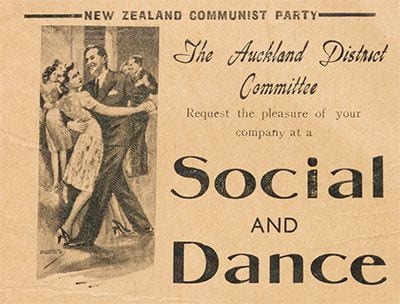During its chequered 73-year existence, the Communist Party of New Zealand (CPNZ) was involved in many of the century’s political upheavals. Its influence on New Zealand history belied its small, dedicated and, at times, stigmatised membership, which was frequently under state surveillance. The spectre of communism loomed over New Zealand society for much of the twentieth century. And then it vanished.
A new Special Collections display marks the centenary of the 1921 formation of the CPNZ by looking at two aspects of its history: its members’ social events (offering an unexpected glimpse into the party’s culture) and its response to the global communist movement during the tumultuous era of the Cold War.
Local and global activity
Sources differ over the exact date of the CPNZ’s establishment in 1921: one suggests the Easter weekend 25-27 March while another mentions 9 April.2 Either way, we do know there was a joint meeting at this time of the New Zealand Marxian Society and the Wellington Socialist Party at the Socialist Hall on Manners Street, Wellington. It was organised to discuss the formation of a new Marxist-Leninist party in the wake of the successful Bolshevik revolution in Russia.
CPNZ archives and published items held by Special Collections document a party prone to internal conflicts and personality clashes, fuelled by intense ideological arguments over the correct path to a communist state in New Zealand. But the papers also reveal the human face of the struggle: picnics, sports days, summer outings, beauty pageants and dances were put on as fund-raising events by the local Auckland branch committee. One such gathering was the supper and dance evening held at the Masonic Hall on Upper Queen Street in November 1946, featuring music from the Melody Hawaiians’ Band, an exhibition tango routine, and Vic Wilcox, CPNZ Arch Hill general election candidate (pictured above).
Tensions within the CPNZ reached their peak after the Second World War, paradoxically, when global communism was at its zenith. The Soviet Union’s crushing of the Hungarian people’s uprising in late 1956 triggered mass resignations. The leadership’s endorsement of the repression, disseminated in the pamphlet The truth about Hungary, was the final straw for several of the party faithful.
However, through its newspapers, pamphlets, and grassroots activism, its impact on New Zealand society was far greater than the sum of its parts. Its influence was felt in trade unions, the peace movement, the struggle for women’s rights, and in anti-Apartheid protests. The CPNZ was also a presence on the global communist stage, being the first national communist party to break with the Soviet Union in the early 1960s and align itself with China and Chairman Mao. One constant was the party’s loyalty to the legacies of Lenin and Stalin. With the end of the Cold War and the demise of the Soviet Union in 1991 this position was untenable; what was left of the CPNZ in 1994 abandoned communism.4
The many facets of the CPNZ’s history are captured in the extensive range of archival materials and published items held in Special Collections, which were acquired largely through the collecting work done by Bert Roth. A prolific New Zealand trade union and labour historian, Roth was also University of Auckland Deputy Librarian between 1962 and 1983.5 His endeavours mean we have a rich repository of materials from this revolutionary party.
Discover more
Visit the display until 16 April, Special Collections, Level G, General Library.
Explore finding aids for the CPNZ-related archival collections:
- Communist Party of New Zealand Records, MSS & Archives A-9
- Doug Crosado interview with members of the Communist Party of New Zealand, MSS & Archives A-184.
Ian Brailsford, Special Collections
References
1 CPNZ Auckland district ‘Social and Dance’ flyer, 1946. CPNZ records, MSS & Archives A-9, 119.
2 Taylor, K. (1994). Our motto, no compromise: the ideological origins and foundation of the Communist Party of New Zealand. New Zealand Journal of History 28(2), p.160; Socialist Unity Party (1986). Communism in New Zealand: an illustrated history. Wellington: Socialist Unity Party, p.15.
3 CPNZ. (1956) Truth about Hungary. NZ Pamphlets 78-221.
4 Rapson, B. (1994). ‘Communists purge name’. New Zealand Herald, 2 November, p.2.
5 Taylor, K. (1994). ‘A labour of love: the making of Bert Roth, labour historian’ in Walsh, P. (ed.) Pioneering New Zealand labour history: essays in honour of Bert Roth. Palmerston North: Dunmore Press, pp.9-20.


